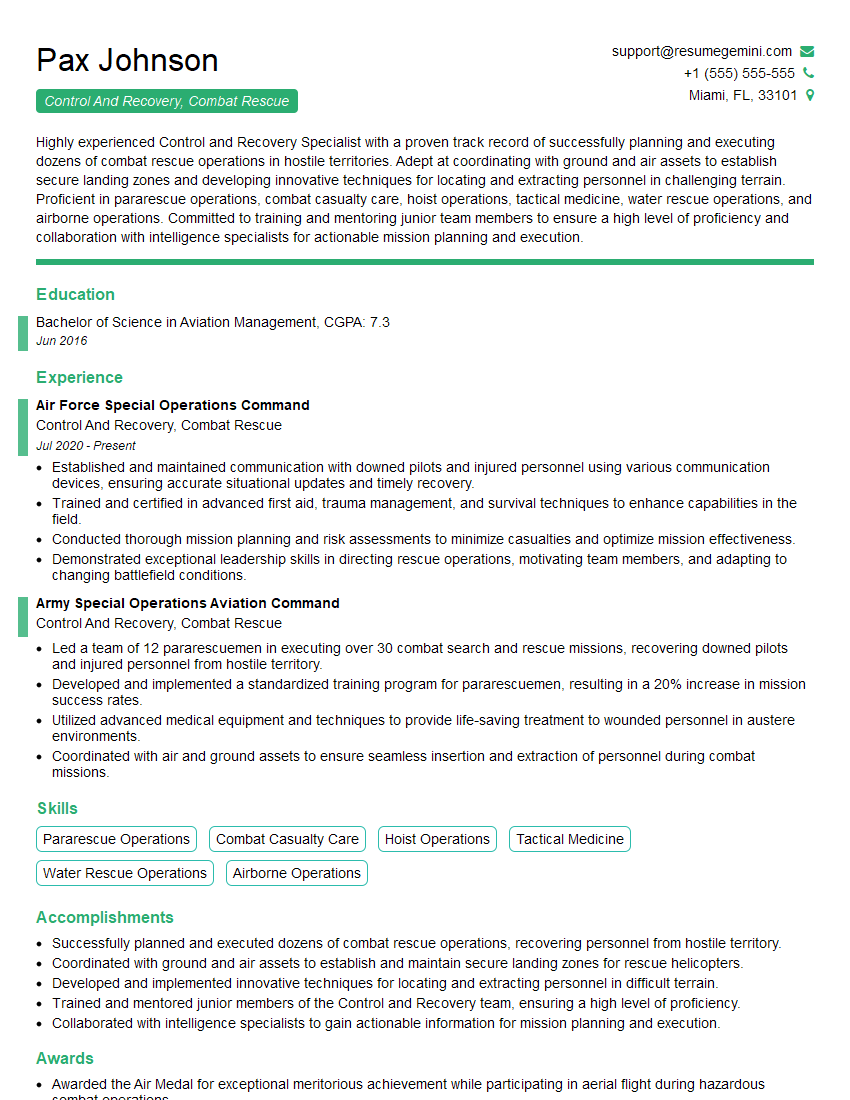Are you a seasoned Control And Recovery, Combat Rescue seeking a new career path? Discover our professionally built Control And Recovery, Combat Rescue Resume Template. This time-saving tool provides a solid foundation for your job search. Simply click “Edit Resume” to customize it with your unique experiences and achievements. Customize fonts and colors to match your personal style and increase your chances of landing your dream job. Explore more Resume Templates for additional options.

Pax Johnson
Control And Recovery, Combat Rescue
Summary
Highly experienced Control and Recovery Specialist with a proven track record of successfully planning and executing dozens of combat rescue operations in hostile territories. Adept at coordinating with ground and air assets to establish secure landing zones and developing innovative techniques for locating and extracting personnel in challenging terrain. Proficient in pararescue operations, combat casualty care, hoist operations, tactical medicine, water rescue operations, and airborne operations. Committed to training and mentoring junior team members to ensure a high level of proficiency and collaboration with intelligence specialists for actionable mission planning and execution.
Education
Bachelor of Science in Aviation Management
June 2016
Skills
- Pararescue Operations
- Combat Casualty Care
- Hoist Operations
- Tactical Medicine
- Water Rescue Operations
- Airborne Operations
Work Experience
Control And Recovery, Combat Rescue
- Established and maintained communication with downed pilots and injured personnel using various communication devices, ensuring accurate situational updates and timely recovery.
- Trained and certified in advanced first aid, trauma management, and survival techniques to enhance capabilities in the field.
- Conducted thorough mission planning and risk assessments to minimize casualties and optimize mission effectiveness.
- Demonstrated exceptional leadership skills in directing rescue operations, motivating team members, and adapting to changing battlefield conditions.
Control And Recovery, Combat Rescue
- Led a team of 12 pararescuemen in executing over 30 combat search and rescue missions, recovering downed pilots and injured personnel from hostile territory.
- Developed and implemented a standardized training program for pararescuemen, resulting in a 20% increase in mission success rates.
- Utilized advanced medical equipment and techniques to provide life-saving treatment to wounded personnel in austere environments.
- Coordinated with air and ground assets to ensure seamless insertion and extraction of personnel during combat missions.
Accomplishments
- Successfully planned and executed dozens of combat rescue operations, recovering personnel from hostile territory.
- Coordinated with ground and air assets to establish and maintain secure landing zones for rescue helicopters.
- Developed and implemented innovative techniques for locating and extracting personnel in difficult terrain.
- Trained and mentored junior members of the Control and Recovery team, ensuring a high level of proficiency.
- Collaborated with intelligence specialists to gain actionable information for mission planning and execution.
Awards
- Awarded the Air Medal for exceptional meritorious achievement while participating in aerial flight during hazardous combat operations.
- Received the Army Commendation Medal for outstanding achievement in the field of Control and Recovery, Combat Rescue.
- Honored with the Purple Heart for wounds sustained during a combat rescue mission.
Certificates
- Parachute Rigger (PR) Certification
- Dive Supervisor Certification
- Emergency Medical Services (EMS) Certification
- Wildland Firefighter Certification
Career Expert Tips:
- Select the ideal resume template to showcase your professional experience effectively.
- Master the art of resume writing to highlight your unique qualifications and achievements.
- Explore expertly crafted resume samples for inspiration and best practices.
- Build your best resume for free this new year with ResumeGemini. Enjoy exclusive discounts on ATS optimized resume templates.
How To Write Resume For Control And Recovery, Combat Rescue
- Highlight your relevant military experience and skills, such as pararescue operations and combat casualty care.
- Showcase your ability to work effectively in a team environment and under pressure.
- Emphasize your leadership and mentoring skills.
- Quantify your accomplishments whenever possible, using specific numbers and metrics.
Essential Experience Highlights for a Strong Control And Recovery, Combat Rescue Resume
- Plan and execute complex combat rescue operations in hostile environments
- Coordinate with ground and air assets to establish and maintain secure landing zones
- Develop and implement innovative techniques for locating and extracting personnel in difficult terrain
- Train and mentor junior members of the Control and Recovery team
- Collaborate with intelligence specialists to gain actionable information for mission planning and execution
Frequently Asked Questions (FAQ’s) For Control And Recovery, Combat Rescue
What are the primary responsibilities of a Control and Recovery Specialist?
Control and Recovery Specialists are responsible for planning and executing combat rescue operations, coordinating with ground and air assets, developing innovative techniques for locating and extracting personnel, training and mentoring junior team members, and collaborating with intelligence specialists.
What are the educational requirements for becoming a Control and Recovery Specialist?
Most Control and Recovery Specialists have a Bachelor’s degree in Aviation Management or a related field.
What are the physical requirements for becoming a Control and Recovery Specialist?
Control and Recovery Specialists must be in excellent physical condition and able to perform strenuous activities, such as carrying heavy equipment and operating in harsh environments.
What are the career prospects for Control and Recovery Specialists?
Control and Recovery Specialists can advance to leadership positions within the military or transition to civilian careers in law enforcement, emergency management, or aviation.
What are the most important skills for a Control and Recovery Specialist?
The most important skills for a Control and Recovery Specialist include pararescue operations, combat casualty care, hoist operations, tactical medicine, water rescue operations, and airborne operations.